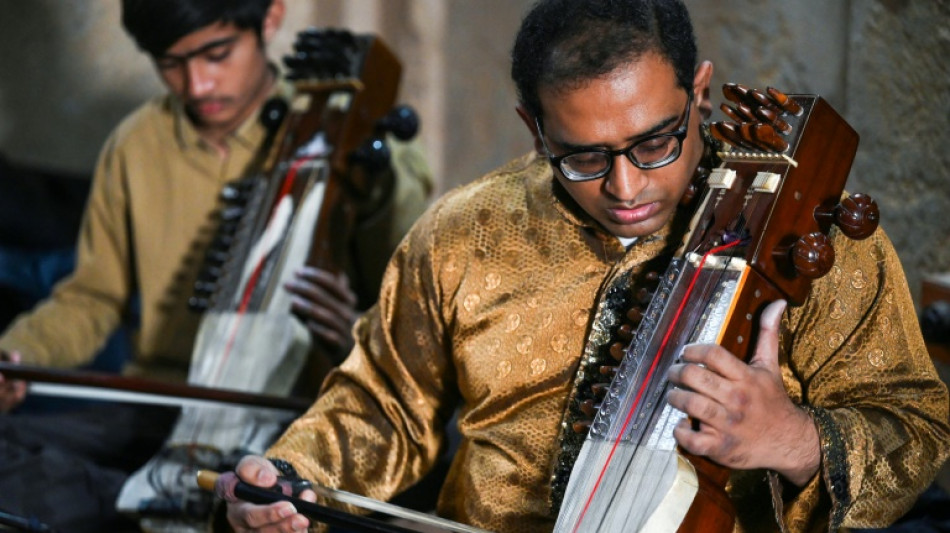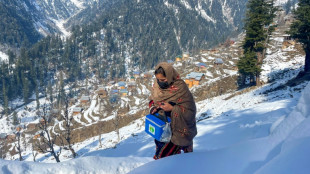
-
 Hermoso pressured to downplay kiss, brother tells Spain court
Hermoso pressured to downplay kiss, brother tells Spain court
-
MotoGP champion Martin breaks hand and foot in Malaysia crash

-
 US trade gap swells in 2024 as deficits under fresh scrutiny
US trade gap swells in 2024 as deficits under fresh scrutiny
-
Aga Khan: five things about the prince of sport

-
 Rubio sees Guatemala leader keen to please US
Rubio sees Guatemala leader keen to please US
-
Swedish king leads mourning after school massacre

-
 US Postal Service halts China suspension after stoking trade fear
US Postal Service halts China suspension after stoking trade fear
-
Steel decline sparks protests and a movie in Belgium

-
 Root 'crucial' for England ahead of Champions Trophy, says skipper
Root 'crucial' for England ahead of Champions Trophy, says skipper
-
Chelsea star Kerr 'feared for my life' during taxi ride

-
 India's Rohit insists struggles 'nothing new' ahead of England ODIs
India's Rohit insists struggles 'nothing new' ahead of England ODIs
-
Even in career twilight, Ronaldo's star undimmed at 40

-
 Barca avoiding 'excuses' after Real Madrid ref complaints: Flick
Barca avoiding 'excuses' after Real Madrid ref complaints: Flick
-
Australia fear rank turner for second Sri Lanka Test

-
 EU seeks new import fee on e-commerce packages
EU seeks new import fee on e-commerce packages
-
Oscars frontrunner 'Emilia Perez' suffers awards season crash

-
 Swedish police say school killing spree gunman likely shot himself
Swedish police say school killing spree gunman likely shot himself
-
Stocks, dollar drop as tariff tensions intensify

-
 Oil giants TotalEnergies, Equinor reduce low-carbon investments
Oil giants TotalEnergies, Equinor reduce low-carbon investments
-
Kremlin calls Zelensky's readiness for Putin talks 'empty words'

-
 Trump bid to take over Gaza, move Palestinians faces backlash
Trump bid to take over Gaza, move Palestinians faces backlash
-
Liverpool's Slot not a fan of in-stadium VAR announcements

-
 Stiff competition awaits as Vonn hunts gold in world super-G
Stiff competition awaits as Vonn hunts gold in world super-G
-
Pakistan health workers kick off polio drive despite snow

-
 Austria's Puchner tops second downhill training at world champs
Austria's Puchner tops second downhill training at world champs
-
Bid to sell Suu Kyi's Myanmar mansion flops for third time

-
 Aga Khan: racehorse billionaire and Islamic spiritual leader
Aga Khan: racehorse billionaire and Islamic spiritual leader
-
China slams US 'suppression' as trade war deepens

-
 Sri Lanka's Karunaratne to bow out of Tests after 'fulfilling dream'
Sri Lanka's Karunaratne to bow out of Tests after 'fulfilling dream'
-
Philippine House votes to impeach VP Sara Duterte

-
 Tokyo police bust alleged prostitution ring targeting tourists
Tokyo police bust alleged prostitution ring targeting tourists
-
Baltics to cut Soviet-era ties to Russian power grid

-
 Iraq's famed 'hunchback' of Mosul rebuilt brick by brick
Iraq's famed 'hunchback' of Mosul rebuilt brick by brick
-
Stock markets stutter as traders weigh China-US trade flare-up

-
 Hamas rejects Trump proposal to take over Gaza, move Palestinians
Hamas rejects Trump proposal to take over Gaza, move Palestinians
-
MotoGP champion Martin taken to hospital after Malaysia crash

-
 YouTubers causing monkeys to attack tourists at Cambodia's Angkor Wat
YouTubers causing monkeys to attack tourists at Cambodia's Angkor Wat
-
Sweden reels from worst mass shooting in its history

-
 India's Modi takes ritual dip at Hindu mega-festival
India's Modi takes ritual dip at Hindu mega-festival
-
Nissan shares fall as reports say Honda merger talks off

-
 US Postal Service says suspending parcels from China
US Postal Service says suspending parcels from China
-
Toyota announces Lexus EV plant in Shanghai

-
 Santander reports record profit for third straight year
Santander reports record profit for third straight year
-
No new clothes: S. Korean climate activist targets hyperconsumption

-
 Cummins 'hugely unlikely' for Australia's Champions Trophy bid
Cummins 'hugely unlikely' for Australia's Champions Trophy bid
-
Nissan shares plunge as report says Honda merger talks off

-
 China holds out hope last-minute deal can avert US trade war
China holds out hope last-minute deal can avert US trade war
-
LeBron relishing 'special' Doncic double act

-
 Tatum shines as Celtics down Cavs, Lakers thrash Clippers
Tatum shines as Celtics down Cavs, Lakers thrash Clippers
-
Myanmar junta bid to sell Suu Kyi mansion flops for third time


Sound of Mughal-era sarangi instrument fading away in Pakistan
In the shadow of Lahore's centuries-old Badshahi Mosque, Zohaib Hassan plucks at the strings of a sarangi, filling the streets with a melodious hum and cry.
Remarkable for its resemblance to the human voice, the classical instrument is fading from Pakistan's music scene –- except for a few players dedicated to preserving its place.
Difficult to master, expensive to repair, and with little financial reward for professionals, the sarangi's decline has been difficult to halt, Hassan told AFP.
"We are trying to keep the instrument alive, not even taking into account our miserable financial condition," he said.
For seven generations, his family has mastered the bowed, short-necked instrument and Hassan is well-respected across Pakistan for his abilities, regularly appearing on television, radio and at private parties.
"My family's craze for the instrument forced me to pursue a career as a sarangi player, leaving my education incomplete," he said.
"I live hand-to-mouth as the majority of directors arrange musical programmes with the latest orchestras and pop bands."
Traditional instruments are competing with a booming R&B and pop scene in a country where more than 60 percent of the population is aged under 30.
Sara Zaman, a classical music teacher at the National Council of Arts in Lahore, said alongside the sarangi, other traditional instruments such as the sitar, santoor, and tanpura are also dying out.
"Platforms have been given to other disciplines like pop music, but it has been missing in the case of classical music," she said.
"The sarangi, being a very difficult instrument, has not been given due importance and attention in Pakistan leading to its gradual demise."
- 'The strings of my heart' -
The sarangi gained prominence in Indian classical music in the 17th century, during the reign of the Mughals in the subcontinent.
Its decline began in the 1980s after the death of several master players and classical singers in the country, said Khwaja Najam-ul-Hassan, a television director who has created an archive of Pakistan's leading musicians.
"The instrument was close to the hearts of the top internationally acclaimed male and female classical singers, but it began to fade away after they died," he said.
Ustad Allah Rakha, one of Pakistan's most globally acclaimed sarangi players, died in 2015 after a career that saw him perform with orchestras around the world.
Now players say they struggle to survive on performance fees alone, often much smaller than those paid to modern guitarists, pianists or violinists.
Carved by hand from a single block of cedar native to parts of Pakistan, the sarangi's primary strings are made of goat gut while the seventeen sympathetic strings –- a common feature on subcontinent folk instruments –- are steel.
The instrument costs around 120,000 rupees ($625) and most of its parts are imported from neighbouring India, where it remains a principal part of the canon.
"The price has gone up as there is a ban on imports from India," said Muhammad Tahir, the owner of one of only two repair shops in Lahore.
Pakistan downgraded diplomatic ties and stopped bilateral trade with India over New Delhi's decision in 2019 to strip the disputed Jammu and Kashmir region of its semi-autonomous status.
Tahir, who spends around two months carefully restoring a single worn-out sarangi, said no one in Pakistan manufactures the special steel strings because of the lack of demand.
"There is no admiration for sarangi players and the few people who are repairing this wonderful instrument," said Ustad Zia-ud-Din, the owner of the other Lahore repair shop, which has existed in some form for 200 years.
Efforts to adapt to the modern music scene have shown pockets of promise.
"We have invented new ways of playing, including making the sarangi semi-electric to enhance the sound during performances with modern musical instruments," said Hassan of the academy he runs in Lahore.
He has now performed several times with the adapted instrument, and says the reception has been positive.
One of the few students is 14-year-old musician Mohsin Muddasir, who has shunned instruments such as the guitar to take on the sarangi.
"I am learning this instrument because it plays with the strings of my heart," he said.
J.Fankhauser--BTB



